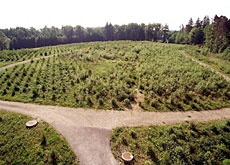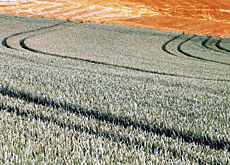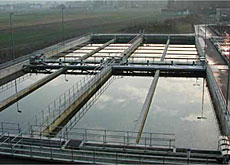3,000 polluted sites need urgent clean-up

Over 50,000 sites are polluted in Switzerland – of which 3,000 require urgent action in the next few years.
The authorities say a national campaign to clean up these areas will cost millions of Swiss francs.
A scandal over two waste dumps first drew public attention to the extent of the pollution problem in Switzerland.
Between 1961 and 1976, 114,000 tons of solvents, pesticides and other pollutants were dumped at Bonfol in western Switzerland by large chemical companies based in Basel.
A clean-up operation is expected to take several years and cost SFr280 million ($228 million).
It was a similar story at Kölliken in canton Aargau, where it took six years and more than SFr400 million to clean up the 560,000 tons of toxic material left behind by the industrial triangle of Zurich, Aargau and Basel.
According to the Swiss Environment Agency, there are a further 50,000 polluted sites in Switzerland – private, public and industrial.
Although most of them have been classed as not harmful to humans or the environment, the authorities say five per cent of the sites require urgent action.
“According to our calculations, there are probably 3,000 contaminated sites that should be cleaned up over the next few years,” the agency’s Bernhard Hammer told swissinfo.
“The most problematic sites can generally be attributed to industrial pollution,” he added.
Triple threat
Hammer said the toxic and chemical substances dumped at such sites could pollute the ground and have serious consequences for air and water quality.
He explained that the pollution risk was the highest for water, especially as there was a risk that drinking water could also become contaminated.
Other sites have been found to emit dangerously high levels of gases, such as methane.
Another problem lies in the fact that homes have been built on old rubbish sites which were not considered to be dangerous at the time.
In order to determine the full extent of the problem, the authorities are currently drawing up a list of polluted sites in Switzerland.
In some cases, the authorities may only need to cordon off a site and wait for it to decontaminate naturally.
But other areas will need to be decontaminated and the underground water filtered and cleaned – all of which are costly operations.
Costly clean-up
“We estimate that basically we’ll need to spend about SFr5 billion over a generation to carry out all this work,” said Hammer.
“Of this, SFr2 billion will have to be covered by public authorities,” he added.
But the environmental group, Greenpeace, says that SFr5 billion will not be enough to cover all the costs of decontaminating sites.
“To rid Switzerland of all the pollution that has accumulated until now, one would probably need SFr50 billion,” Greenpeace’s Matthias Wüthrich told swissinfo.
“But the principle of whoever pollutes must pay is very difficult to apply in modern-day Switzerland. The Bonfol case showed, for example, that only enormous public pressure can push the chemical industry into assuming the cleaning-up costs,” added Wüthrich.
However, the group considers the Kölliken and Bonfol cases a good start to the national clean-up campaign – especially as some of the costs will be borne by those responsible for the pollution.
Satisfactory law – within limits
Switzerland has been trying to tighten pollution regulations. The country recently passed a law to ensure that the Bonfol scandal is not repeated, and since 2000 it has been obligatory for all organic waste to be collected separately and incinerated.
Greenpeace says it is largely satisfied with the present legislation, but the organisation still has some reservations, especially about the use of incineration.
Wüthrich says that the residues from the filters in incineration plants contain a deadly cocktail of toxic substances such as dioxins.
He adds that these substances can be safely disposed of in the ground if the correct procedures are applied, but he warns that this could lead to pollution problems in the future.
Another problem that Wüthrich foresees is globalisation.
“The so-called industrialised countries are producing less and less industrial waste themselves,” Wüthrich told swissinfo.
“It has instead been transferred to the countries in the South. Contaminants are now coming from these places as well.”
swissinfo, Armando Mombelli (translation: Isobel Leybold)
About 50,000 sites are contaminated in Switzerland.
3,000 must be cleaned up within the next few years.
The cost of the clean-up is estimated at SFr5 million.

In compliance with the JTI standards
More: SWI swissinfo.ch certified by the Journalism Trust Initiative




You can find an overview of ongoing debates with our journalists here . Please join us!
If you want to start a conversation about a topic raised in this article or want to report factual errors, email us at english@swissinfo.ch.